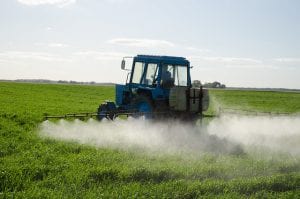Categories | News & Politics
Article
EPA Decides Not to Ban a Pesticide Despite Strong Links to Parkinson's Disease
April 1st, 2021
•
News & Politics
•
6 minute read

EPA Decides Not to Ban a Pesticide Despite Strong Links to Parkinson's Disease
In October 2020, the Environmental Protection Agency (EPA) extended the use of the toxic pesticide paraquat. That was despite the agency's earlier conclusion, that this pesticide poses potential risks to people, wildlife, and the environment. It was a measure that allows the agency to keep the pesticide on the market until 2035.In this regulatory step, known as an interim decision, the EPA didn't repudiate its earlier assessment regarding potential public health and ecological impacts. But the agency said that paraquat is still going through the Federal Insecticide, Fungicide, and Rodenticide Act (FIFRA) registration review process. A group of 52 farm workers, environmental justice, public health, conservation, and farmer advocacy groups submitted a letter in response, urging the EPA to ban paraquat because of its substantial and demonstrated risks. The Michael J. Fox Foundation and the Unified Parkinson's Advocacy Council, which earlier submitted a petition with 107,000+ community signatures, also continue to fight for a ban.The EPA says it's still re-evaluating the chemical. However, the current extension of use for this extremely toxic, old pesticide may cause serious long-term harm to people and wildlife. The EPA should be banning paraquat. Instead, the agency has steadfastly refused to complete legally required analyses of the pesticide's impacts on endangered plants and animals. The Dangers of Paraquat UseParaquat has been commercially used since 1964. Most users know it by its trade name, Gramoxone. When many farmers see superweeds develop resistance to glyphosate, commonly sold as Bayer’s Roundup, paraquat is the chemical that they resort to.That is why the chemical's use is higher than it’s been in the past 25 years, despite its well-documented harms. Since 2009, its use rose nearly 200%. However, users have to be certified pesticide applicators who went through specialized training. Because this chemical is the most acutely lethal herbicide still in use today, corrosive to the skin and eyes, that may be inhaled, it’s also transferred onto clothing and will subsequently rub off onto home furniture. So users have to be very careful when handling it. Paraquat enters the body mainly by swallowing, or through dermal exposure. Once the skin is damaged, paraquat is absorbed into the body. Paraquat has resulted in the death of at least 50 people in the United States in recent years. One farmer died after just 3.5 hours of spraying diluted paraquat with a leaking knapsack. Others have died from spilling the pesticide on their skin. Thousands more have suffered severe chronic and acute effects from occupational use.Paraquat and Parkinson's Disease
 Agricultural pesticide application. Image via Flickr/user:Aqua Mechanical. (CCA-BY-2.0).
Agricultural pesticide application. Image via Flickr/user:Aqua Mechanical. (CCA-BY-2.0).

About Miguel Leyva
Miguel Leyva has extensive knowledge in establishing eligibility for product liability and toxic exposure claims. Miguel is a Case Manager at Atraxia Law, where he provides the necessary assistance to help families affected by harmful or defective products understand their injuries and recover compensation.
